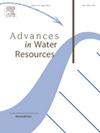Modeling hydro-thermal processes in fractured geothermal reservoirs using embedded discrete fracture model (EDFM) and MRST
IF 4.2
2区 环境科学与生态学
Q1 WATER RESOURCES
引用次数: 0
Abstract
Fractures critically influence fluid flow and heat transfer in geothermal reservoirs, necessitating accurate and efficient simulation tools for resource management. Here we introduce ETH, an open-source Embedded Discrete Fracture Model (EDFM) module integrated with the MATLAB Reservoir Simulation Toolbox (MRST), enabling coupled hydrothermal simulations in both 2D and 3D fractured porous media. ETH extends prior EDFM frameworks by incorporating heat transfer and variable fluid properties, validated through four benchmarks ranging from analytical single-fracture cases to complex 3D fracture networks. Results demonstrate high accuracy (relative errors mostly <1 %) and computational efficiency, with 20–50 % reduced cost compared to FEM-based discrete fracture models. ETH’s modular design supports mesh/time convergence control and integration of additional physics, facilitating robust modeling of heterogeneous and anisotropic reservoirs. This tool advances accessible, high-fidelity simulation capabilities for geothermal reservoir characterization, development, and uncertainty quantification.
基于嵌入离散裂缝模型(EDFM)和MRST的裂缝性地热储层热液过程建模
裂缝对地热储层的流体流动和换热具有重要影响,因此需要精确、高效的模拟工具来进行资源管理。在这里,我们介绍ETH,一个开源的嵌入式离散裂缝模型(EDFM)模块,集成了MATLAB油藏模拟工具箱(MRST),可以在二维和三维裂缝性多孔介质中耦合热液模拟。ETH扩展了之前的EDFM框架,结合了传热和可变流体特性,并通过从分析单裂缝案例到复杂3D裂缝网络的四个基准进行了验证。结果表明,与基于有限元的离散裂缝模型相比,该模型具有较高的精度(相对误差约为1%)和计算效率,成本降低了20 - 50%。ETH的模块化设计支持网格/时间收敛控制和额外物理的集成,促进了非均质和各向异性油藏的稳健建模。该工具为地热储层表征、开发和不确定性量化提供了方便、高保真的模拟能力。
本文章由计算机程序翻译,如有差异,请以英文原文为准。
求助全文
约1分钟内获得全文
求助全文
来源期刊

Advances in Water Resources
环境科学-水资源
CiteScore
9.40
自引率
6.40%
发文量
171
审稿时长
36 days
期刊介绍:
Advances in Water Resources provides a forum for the presentation of fundamental scientific advances in the understanding of water resources systems. The scope of Advances in Water Resources includes any combination of theoretical, computational, and experimental approaches used to advance fundamental understanding of surface or subsurface water resources systems or the interaction of these systems with the atmosphere, geosphere, biosphere, and human societies. Manuscripts involving case studies that do not attempt to reach broader conclusions, research on engineering design, applied hydraulics, or water quality and treatment, as well as applications of existing knowledge that do not advance fundamental understanding of hydrological processes, are not appropriate for Advances in Water Resources.
Examples of appropriate topical areas that will be considered include the following:
• Surface and subsurface hydrology
• Hydrometeorology
• Environmental fluid dynamics
• Ecohydrology and ecohydrodynamics
• Multiphase transport phenomena in porous media
• Fluid flow and species transport and reaction processes
 求助内容:
求助内容: 应助结果提醒方式:
应助结果提醒方式:


